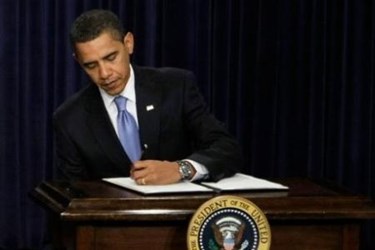Obama Considers Ebola Czar

By Christine Kern, contributing writer

Increasing pressure in the wake of the Ebola crisis points to the growing need for coordinated oversight.
Under growing pressure to appoint an Ebola “czar” to oversee the U.S. response to the growing global epidemic, President Barack Obama has acknowledged it “may be appropriate” to name such an administrator, according to Modern Healthcare.
Obama made a series of extemporaneous remarks following a meeting with his Cabinet regarding the Ebola outbreak in West Africa, including, “The biggest thing we need to do is make sure our health workers have more confidence.” He went on to say he would take the appointment of a point person in the administration to dedicate attention on Ebola response seriously, a position immediately dubbed an "Ebola czar" by members of the press.
Senator John McCain, in an interview with Candy Crowley on “State of the Union,” also wanted to know “who’s in charge.” In a YouTube clip of the CNN interview, McCain said, "I would say that we don't know exactly who's in charge. There has to be some kind of czar.”
CBS News reports McCain joined other Republican lawmakers – Reps. Jack Kingston of Georgia, Frank Wolf of Virginia and Sens. Jerry Moran of Kansas and Rob Portman of Ohio – who believe there must be a single point person within the administration responsible for ensuring the deadly virus does not spread in the U.S. According to The White House, that “point person” is Lisa Monaco, President Obama's homeland security adviser, who is responsible for the interagency response.
Yet some have argued there are already positions in place that should be serving as the “Ebola Czar.” One former official, Michael Leavitt, Secretary of Health and Human Services (HHS) under President George W. Bush, told CBS News that there's no reason to add an Ebola czar if the current management structure is working.
And a Federalist article argues Dr. Francis Collins, head of the National Institutes of Health (NH), is already in place and should act as “czar.” Collins told The Huffington Post, “NIH has been working on Ebola vaccines since 2001. It's not like we suddenly woke up and thought, 'Oh my gosh, we should have something ready here.’ Frankly, if we had not gone through our 10-year slide in research support, we probably would have had a vaccine in time for this that would’ve gone through clinical trials and would have been ready.”
And of course there is “The Nation’s Doctor,” or the Surgeon General. Currently, the post is vacant, as President Obama's nominee for the post, Dr. Vivek Murthy, has yet to be confirmed due to gridlock in the Senate, according to CBS News. However, Leavitt countered the Surgeon General probably would not be a key point person, since despite the surgeon general’s "strong brand," the reality is that the office "with very little responsibility in the context of comprehensive emergency management."
Leavitt pointed out that the surgeon general answers to the assistant secretary for health, who answers to the HHS secretary, who then briefs the President.
